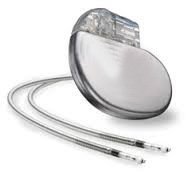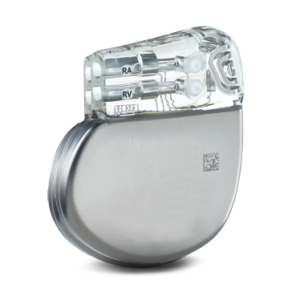Pacemaker Follow-up Clinic
 For patients with pacemakers, Buffalo Heart Group offers comprehensive follow-up performed by Registered Nurses that specialize in pacemaker and ICD technology. The purpose of this follow-up is to check that the pacemaker is functioning properly; to make sure that the device is programmed appropriately for your changing needs; and to monitor the battery status.
For patients with pacemakers, Buffalo Heart Group offers comprehensive follow-up performed by Registered Nurses that specialize in pacemaker and ICD technology. The purpose of this follow-up is to check that the pacemaker is functioning properly; to make sure that the device is programmed appropriately for your changing needs; and to monitor the battery status.
In a typical pacemaker evaluation, we will attach ECG electrodes and record and analyze the ECG. We will then use a programming device to evaluate your pacemaker and gather information stored by the pacemaker, which allows us to check its function. We also use a programmer and/or a magnet to evaluate the battery status of your pacemaker. Finally, we check the final settings of your pacemaker and make any changes that would be beneficial to meet your particular lifestyle or medical condition.
A pacemaker office evaluation generally lasts approximately 15-30 minutes. There is no discomfort involved, and you and your family member will be able to learn more about your pacemaker and have an opportunity to ask questions. We will generally see you approximately 2 weeks after your implant surgery and then every 3-4 months thereafter.
Implantable Cardiac Defibrilator Follow-up Clinic
 We offer comprehensive follow-up for patients with IMPLANTABLE CARDIAC DEFIBRILATOR’S. This is done at Buffalo Heart Group by registered nurses that specialize in pacemaker and IMPLANTABLE CARDIAC DEFIBRILATOR technology. Follow-up visits allow us to check that your IMPLANTABLE CARDIAC DEFIBRILATOR is working properly; that it is programmed appropriately; and evaluate the IMPLANTABLE CARDIAC DEFIBRILATOR battery.
We offer comprehensive follow-up for patients with IMPLANTABLE CARDIAC DEFIBRILATOR’S. This is done at Buffalo Heart Group by registered nurses that specialize in pacemaker and IMPLANTABLE CARDIAC DEFIBRILATOR technology. Follow-up visits allow us to check that your IMPLANTABLE CARDIAC DEFIBRILATOR is working properly; that it is programmed appropriately; and evaluate the IMPLANTABLE CARDIAC DEFIBRILATOR battery.
We will schedule regular IMPLANTABLE CARDIAC DEFIBRILATOR checkups: initially approximately 2 weeks after your surgery and periodically thereafter. A typical follow-up visit lasts about 20-30 minutes. A programming device will communicate with the IMPLANTABLE CARDIAC DEFIBRILATOR pulse generator in your body. You will not feel these tests while they are occurring. During these sessions, several tests may be done, including:
- Printing out information on how your IMPLANTABLE CARDIAC DEFIBRILATOR performed since your last visit.
- Adjusting the programmed settings of your IMPLANTABLE CARDIAC DEFIBRILATOR, if necessary. As your heart condition may change over time, the programmed settings in your IMPLANTABLE CARDIAC DEFIBRILATOR may need to occasionally be adjusted. This is easily done with the programming device (painlessly).
- Checking the battery to see how much energy remains. If the battery energy is low, plans to replace the pulse generator will be made.
You will also be given the opportunity to learn more about your IMPLANTABLE CARDIAC DEFIBRILATOR and your heart and to ask any questions that you or your family might have regarding the device.
